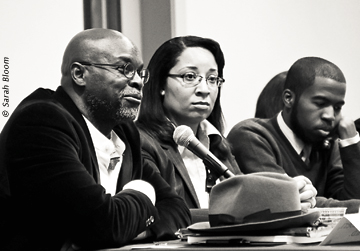New Home, Name, and Faculty for Afro-American Studies
“Thirty years after the Afro-American Studies program was born at Penn, in ferment and discontent, it is wonderful to see us at this point,” said President Judith Rodin at the late-September opening of the Center for Africana Studies in the School of Arts and Sciences, formed from the merger of Afro-American Studies and the Center for the Study of Black Literature and Culture.
Besides the new name, the opening ceremony also celebrated the center’s new, expanded location in the 3401 Walnut building and the arrival of four new affiliated faculty members. The most prominent among them is Dr. Michael Eric Dyson, a leading scholar and public intellectual on race relations whom the University lured away from DePauw University last year to become the Avalon Foundation Professor in the Humanities, teaching courses in religious studies and Africana studies.
The new faculty “strengthens an already formidable lineup of scholars from a very wide range of disciplines,” said Rodin. “All of us have so much to gain and much to learn from studying the history and experience of the entire African diaspora” about humanity’s heights and depths, she added, including “how racist thinking has led to so many human tragedies over the last 500 years and how racism’s terrible legacy continues to warp human relationships and understanding throughout the world.”
In an apparent reference to the flap last year over Harvard University president Lawrence Summers’ disparaging remarks about Cornel West’s rap CD (which, among other issues, is said to have led to West’s leaving Harvard’s African-American studies program for Princeton), Rodin emphasized her “belief that all literary genres, all artifacts, and all forms of cultural expression are fertile ground for serious scholarship. Great universities don’t cordon off any aspect of the human experience from critical inquiry. To the contrary, great universities support any endeavor that expands the body of knowledge.”
In brief remarks that mixed humor with passion—for example, referring to the center’s director, Tukufu Zuberi (who is also on the faculty of the sociology department and the Population Studies Center), as both “the Barry White of the academy” and a “visionary”—Dyson said he was “honored and excited” to be at Penn. He called Africana studies “part of the cutting edge for defining not only what it means to be an American but a global citizen.”
Through “the broad panoply of interests, energies, intelligences, and intuitions that have been brought together under the rubric of Africana studies, we will forge a connection between all of these extraordinary peoples and populations of the world,” he added, “not only fostering a greater in-depth analysis of Africana culture, but to forge links with European cultures and global cultures.”
“If we are seeking knowledge and trying to better understand what it means to be a human being, we cannot do that in isolation of the experience” of non-European cultures,” said Zuberi. “We think it is critically important to understand what Africans and the African diaspora have done, and we look forward to enhancing the place and position of Africana studies at the University of Pennsylvania.”
The center will be marking the 30th anniversary of Afro-American studies at Penn with a year-long series of activities, which can be found at (www.sas.upenn.edu/africana/).


